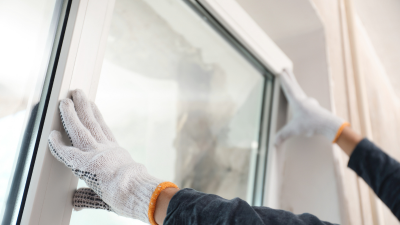
The average three-bedroom house has eight to fourteen windows, which, if maintained properly, should have a lifespan of approximately fifteen to thirty years. When homeowners find themselves looking at window replacement— it’s not an easy decision, and it’s important to consider multiple factors.
Top Reasons to Replace Windows
A crack that splinters the glass or an actual hole in the window usually means replacement. However, it’s essential to know the other, sometimes less obvious, signs that your window(s) needs replacement.
- The window sticks or won’t open/close.
- The lock on the window no longer works.
- There is condensation or fog between the panes.
- You can hear loud exterior noises.
- Your energy bills have increased.
- There are noticeable drafts in the room or near the window.
Replace One or All?
What if there’s only one window in the living room that has condensation or has such a draft coming from it that no one can sit near it? Do you just replace that window, or do you go all in and replace every window in the house?
There is no rule that states that you have to replace all the windows when a single one is the only one with an obvious issue. However, if it’s in a room with one or more additional windows, you should consider replacing all the windows in that room for cohesiveness. You may, however, be able to get an exact replacement of the window if you use the same manufacturer as the old window.
Replacing one or all, for most homeowners, comes down to budget.
Average Cost of New Windows
According to Forbes Home, in 2024, the average cost of window replacement (with labor included) will cost a homeowner between $450 and $1,400 per window. The key takeaway is that $450 to $1,400 per window is the average cost. Costs will vary depending on the area of the country and even from city to city within the same state. Window replacement costs also vary depending on the size and type of the windows.
Things that can affect the cost of replacement windows:
- Location. Where you live affects material and labor costs.
- Size. Larger-sized windows and custom sizes are typically more expensive.
- Type. Aluminum and vinyl windows are usually the least expensive.
- Brand. Certain brands come with a higher price tag.
It’s also important to note that replacing windows can add value to your home. The 2024 Cost VS Value Report from Remodeling Magazine states that window replacement adds an average of about $16,222 to a home or about sixty-three percent of the cost of the project.
What to Know About Choosing Correct Windows
While budget often plays a key factor when choosing replacement windows, there are other considerations. These include but are not limited to:
- Frame material. Wood and fiberglass typically are the most expensive.
- Window type. Skylights are usually the most expensive, while single-hung, hoppers, and storm windows are the least expensive.
- Glass. Energy-efficient low-E coatings cost more but may save you more money in utility bills over time.
Window Replacement Preparation Tips
Window replacement can be a major home project, especially if you’re replacing multiple windows. Before the project begins, it’s essential to have clear communication with your installer about what is expected of you as the homeowner. Things that may need to be done prior to installation include disconnecting alarm systems, removing all obstacles to the windows, and making sure family pets are secure and safe during the installation process.
Once your new windows are installed, it’s critical to maintain them. Window maintenance includes regular, professional cleaning at least twice a year. Let United Window Cleaning handle that chore. Contact us today for an appointment.


